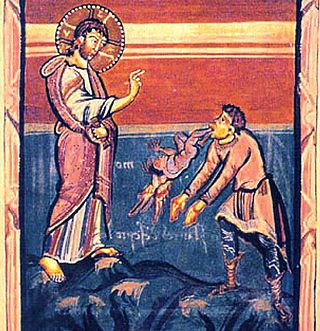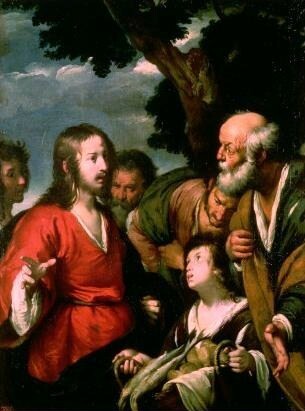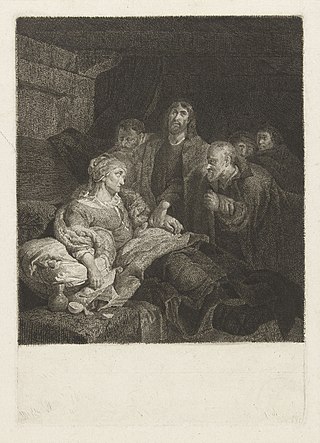Related Research Articles

Matthew 4:23 is the twenty-third verse of the fourth chapter of the Gospel of Matthew in the New Testament. Jesus has just recruited the first four disciples, this verse begins a brief summary of and introduction to Jesus' ministry in Galilee that will be recounted in the next several chapters.

Matthew 5:1 and Matthew 5:2 are the first two verses of the fifth chapter of the Gospel of Matthew in the New Testament. The verses introduce the Sermon on the Mount that will be recited in the next several chapters. The previous chapter concluded with large crowds "from Galilee, and from the Decapolis, Jerusalem, Judea, and beyond the Jordan" who followed Jesus to witness him healing: these verses present Jesus as seeing the crowds and going up onto a mountain to begin teaching.

In Christianity, feeding the multitude comprises two separate miracles of Jesus, reported in the Gospels, in which Jesus used modest resources to feed thousands of followers who had gathered to see him heal the sick.

Matthew 9 is the ninth chapter of the Gospel of Matthew in the New Testament. It continues the narrative about Jesus' ministry in Galilee as he ministers to the public, working miracles, and going through all the cities and towns of the area, preaching the gospel, and healing every disease. This chapter opens with Jesus back in "his own town", i.e. Capernaum. This chapter reflects "the crucial role of faith" in relation to healing.

Matthew 19 is the nineteenth chapter in the Gospel of Matthew in the New Testament section of the Christian Bible. The book containing this chapter is anonymous, but early Christian tradition uniformly affirmed that Matthew composed this Gospel. Jesus commences his final journey to Jerusalem in this chapter, ministering through Perea. It can be seen as the starting point for the passion narrative.

Luke 6 is the sixth chapter of the Gospel of Luke in the New Testament of the Christian Bible, traditionally attributed to Luke the Evangelist, a companion of Paul the Apostle on his missionary journeys. Jesus' teaching about the Sabbath enrages the religious authorities and deepens their conflict. The selection of twelve apostles is recounted and this is followed by the "Sermon on the Plain", where key aspects of Jesus' teaching are presented.

Luke 8 is the eighth chapter of the Gospel of Luke in the New Testament of the Christian Bible. The book containing this chapter is anonymous but early Christian tradition uniformly affirmed that Luke the Evangelist, a companion of Paul the Apostle on his missionary journeys, composed both this Gospel and the Acts of the Apostles. This chapter mentions the women who supported Jesus and records some of the great miracles he performed, as well as several parables told by him.

Luke 9 is the ninth chapter of the Gospel of Luke in the New Testament of the Christian Bible. It records the sending of the twelve disciples, several great miracles performed by Jesus, the story of his transfiguration, Peter's confession and the final departure from Galilee towards Jerusalem. Scottish minister William Robertson Nicoll describes this chapter as unfolding "sundry particulars which together form the closing scenes of the Galilean ministry". The book containing this chapter is anonymous, but early Christian tradition uniformly affirmed that Luke the Evangelist composed this Gospel as well as the Acts of the Apostles.

Matthew 8:34 is a verse in the eighth chapter of the Gospel of Matthew in the New Testament.
Matthew 11:1 is the first verse in the eleventh chapter of the Gospel of Matthew in the New Testament.

Matthew 8:14 is the fourteenth verse of the eighth chapter of the Gospel of Matthew in the New Testament. This verse and the following verse constitute a "simple short story" in which Jesus heals Peter's mother-in-law.

Matthew 8:18 is the 18th verse in the eighth chapter of the Gospel of Matthew in the New Testament.
Matthew 9:35 is a verse in the ninth chapter of the Gospel of Matthew in the New Testament.

Matthew 8:32 is the 32nd verse in the eighth chapter of the Gospel of Matthew in the New Testament.

Matthew 12:13 is the thirteenth verse in the twelfth chapter of the Gospel of Matthew in the New Testament.

Matthew 14:23 is a verse in the fourteenth chapter of the Gospel of Matthew in the New Testament.
Matthew 12:14-16 is a set of verses in the twelfth chapter of the Gospel of Matthew in the New Testament.

Matthew 13:1-2 are the first two verses in the thirteenth chapter of the Gospel of Matthew in the New Testament.
Matthew 14:15-21 is a set of verses in the fourteenth chapter of the Gospel of Matthew in the New Testament.
Matthew 15:29-31 is a set of verses in the fifteenth chapter of the Gospel of Matthew in the New Testament.
References
- ↑ Robert Witham, Annotations on the New Testament of Jesus Christ, Dublin: 1730.
- ↑ John MacEvilly, An Exposition of the Gospel of St. Matthew consisting of an analysis of each chapter and of a Commentary critical, exegetical, doctrinal and moral, Dublin, Gill & Son 1879.
- 1 2 3 Thomas Aquinas, ed. (1874). "Catena aurea: commentary on the four Gospels, collected out of the works of the Fathers: Volume 2, St. Matthew. Oxford: Parker".
 This article incorporates text from this source, which is in the public domain .
This article incorporates text from this source, which is in the public domain .